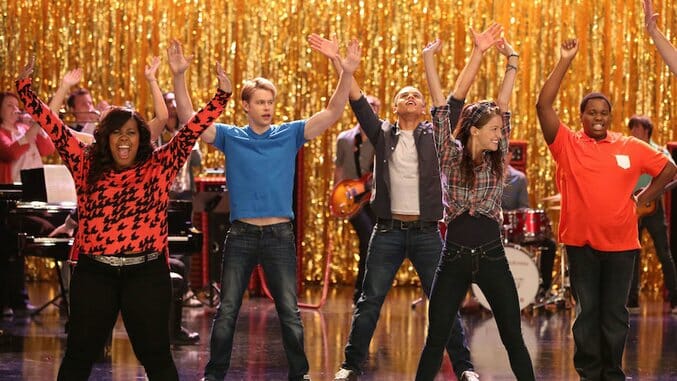Grappling with the Complicated Legacy of Fox’s Glee
If you didn’t watch Glee from 2009-2015 you’ve never known the triumphs and defeats or the epic highs and lows of a televised fever dream.
Photo Courtesy of Fox
During a Fox marathon counting down to the Glee Season 1 finale, I caught Rachel Berry’s performance of “Take a Bow.” My mom had just called me down for dinner but my eyes remained 11 inches away from the crackling TV. I didn’t care that Finn had technically cheated on Quinn by kissing Rachel. Because most of my musical tastes were still defined by Radio Disney at the time, it was rare that I heard a strong belt or any voice that ranged over two octaves. With such an effective rhetorical tool, that one scene fully threw me aboard the “Finchel” ship, and I rooted for the dorkily-dressed singing girl.
For a solid three seasons, I was completely hooked. But the show’s inconsistencies or declining quality aside, the haunting offscreen tragedies have made it impossible for me to watch an episode since 2013. Recently, however, thanks to Twitter and TikTok memes, I’ve been rediscovering the polarizing absurdity of Glee.
The way glee is engaged with in 2020 on twitter is layered in 30 levers of irony. It’s just so different from 2010 tumblr which was 100% sincere like we could still suspend belief it was a good show bc it had emmys and we were 12 pic.twitter.com/HRtcXYaEfM
— Sam (@dondraperkinnie) June 29, 2020
In a media landscape where people were begging for scraps of representation, Glee was the first show for many that constantly depicted and attempted to normalize queer narratives. Considering the generally conservative nature of my household, at age 12, I considered Glee wholesome compared to my habit of watching Adult Swim at 1 AM. At its best Glee was warm-hearted even as it teetered between the limits of abjection, ambition, and solid covers. At its worst Glee peddled stereotypes, overstuffed “contemporary issues,” and committed character assassination on a whim. Its unapologetically politically incorrect jokes operated under the guise of twisted liberal identity politics that transcended ethnicity, sexuality, and gender identity: “because you’re all minorities; you’re in the glee club.”
Now that the viewers of Glee are in their 20s and beyond, the conversation surrounding the show centers on the fact that watching it was indeed a formative experience. More specifically, former Gleeks currently suffer a great deal of brain worms, and they and their loved ones may be entitled to financial compensation (as the joke goes). So now, perhaps like many, the only way I can engage with the show itself is through clip compilations that both make me laugh hysterically and wish that I didn’t know any of the context, able to enjoy these clips purely for the spectacle.
The show’s campiness could be equal parts timeless and offensive, and sometimes eerily accurate.
With a more world-weary lens, the viral clips confirm the suspicions viewers had when they were teens. Quinn deserved better storylines, Santana’s character development made the show worth watching, and “Rachel managed to be equal parts sociopathic and self-victimizing.”
as requested, to celebrate the tenth anniversary of the glee pilot i’m going to do a thread of the absolute worst glee fandom moments
— bethany (@chandIermonica) May 19, 2019
Parody or not, someone should have called child protection services on Will a long time ago. The sheer number of videos with titles like “mr. shue being questionable for more than 7 minutes” or #willschusterjailtime testifies to the character’s lowkey predatory nature.
While my fascination with Glee may be steeped in layers of irony-as-cope, I have always considered Glee to be the show that taught me to love pop culture. Without Glee I would not have developed the palate for Community, Crazy Ex-Girlfriend, or the entire genre of musical theatre. As much as I make fun of the show, I can’t deny that the hairs of my arms stand up when I hear the opening bars of their “Don’t Rain on My Parade” covers. For better or for worse, the show was a trendsetter and tastemaker, which is where some of its strengths can be acknowledged.
“TikTok user Jaylen Baham” seamlessly roleplays each of the characters in his “If Glee were on air in 2020” series. His delivery of Mr. Shue’s “Come on, guys!” and Blaine’s crooning is immaculate. What he does is bring forth the Glee experience without the darker emotional weight. He captures its peculiar zaniness and the cast’s impeccable line readings in the way only someone who really loves the show can.
The same way the opposite of love is apathy, in the words of Mary Oliver, “attention without feeling … is only a report.” The show’s biggest critics were always its biggest fans who wanted the show to reach its full potential. Glee was a fever dream that can never quite be captured in words. But perhaps for now videos like “glee scenes that had me screaming” is the closest approximation of a love language we have.
Jane Song was an intern at Paste and very qualified to talk about culture. You can find her at janesong.net or more frequently on Twitter at @janesingasong.
For all the latest TV news, reviews, lists and features, follow @Paste_TV.







































